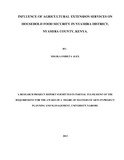| dc.description.abstract | Agricultural extension continues to be in transition worldwide. Governments and international agencies
are advancing structural, financial and managerial reforms to improve extension services for purposes
of increasing agricultural production for addressing food security. This study sought to investigate the
influence of agricultural extension services on household food security in Nyamira District. It was
informed by the objectives; influence of training farmers on modern farming methods, provision of
farm inputs, preservation and storage and marketing strategies on household food security. The study
was grounded on the basic assumptions that the sample selected would represent the target population
in its major features, data collection instrument would be valid and reliable in measuring the desired
outcome and that the respondents would give information honestly and objectively. Literature was
reviewed against the backdrop of previous scholarly works in line with key study variables. Adopted as
a theoretical framework was the social action model propounded by Sloccam in 1962, which explains
how an innovation can be introduced successfully in a frozen community until adopted by several
members of the society. On research methodology, descriptive survey research design was employed,
in which a target population of 5420 was identified from where a sample size of 542 was selected
through stratified random sampling procedures on the basis of the seven locations of Nyamira District.
Data was collected with the help of questionnaire, comprising of open ended, closed and matrix
questions. The instrument was pretested to ascertain its effectiveness in obtaining the necessary data for
the study and validity of the data collection instruments was established through adequate coverage of
research objectives, peer review and expert judgment. Reliability was measured using split half method,
in which the two parts were found to be highly correlated. Descriptive statistics such as frequencies and
percentages were used in data analysis and the resultant information presented in frequency distribution
tables. The study findings revealed that agricultural extension services, packaged in training of farmers,
provision of inputs, preservation and storage and marketing strategies had significant influence on
household food security. The study recommended that policies be formulated by relevant stakeholders
to strengthen extension services in order to boost food production so as to effectively address issues of
food security in a sustainable manner. For further research, the study suggested replication elsewhere to
compare the findings. | en_US |

